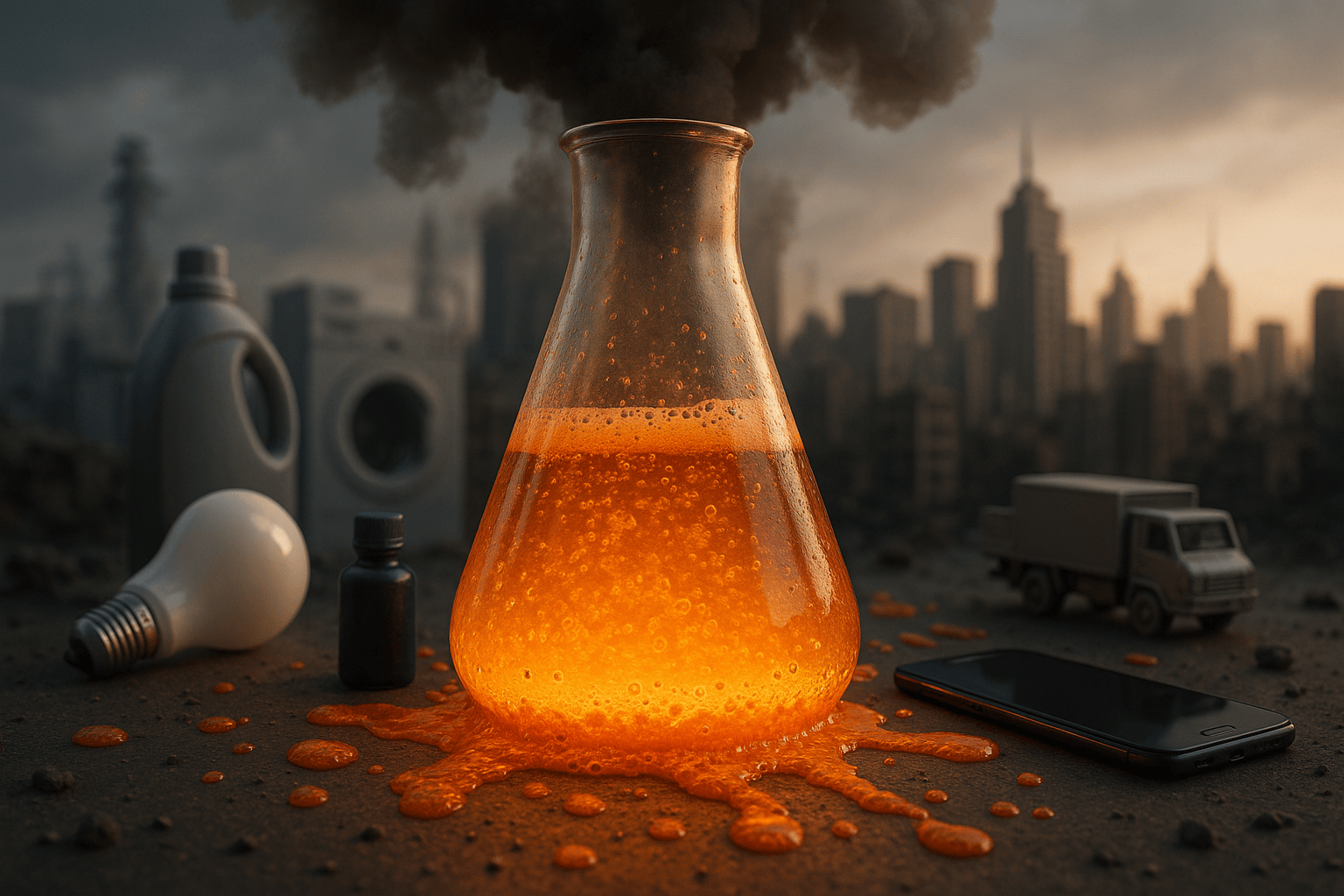You’re brushing your teeth, slipping into a polyester shirt, or sipping from a plastic bottle—everyday moments, right? But behind these routines lies a hidden force: industrial chemicals. These powerful substances are the backbone of countless products, from the soap cleaning your dishes to the fertilizer growing your food. They’re not just for factories; they touch every corner of your life. In Pakistan, where industries drive progress, these chemicals are vital. But what exactly are industrial chemicals, and why are they so essential? This blog uncovers their types, roles, and impact, offering insights for manufacturers or anyone curious about the chemistry in their daily grind. Whether you’re sourcing from an industrial chemicals supplier or just want to understand the science, let’s dive into why these compounds matter!
What Are Industrial Chemicals?
Industrial chemicals are substances produced or used in large quantities for manufacturing, agriculture, or consumer goods, often engineered for specific functions.
- Definition – Chemicals like acids, solvents, or polymers, created or processed for industrial applications, form the basis of countless products.
- Natural vs. Synthetic – Some, like ammonia, are synthesized; others, like natural gas derivatives, come from raw materials.
- Production Scale – Made in bulk by petrochemical companies, these chemicals support industries from textiles to pharmaceuticals.
- Key Examples – Include ethylene for plastics, sulfuric acid for fertilizers, and sodium hydroxide for soaps, all critical in daily life.
- Pakistan’s Role – Local suppliers provide these chemicals to fuel Pakistan’s manufacturing and agricultural sectors.
Industrial chemicals are the invisible sparks that light up everything from your clothes to your crops.
What Are the Main Types of Industrial Chemicals?
Industrial chemicals are categorized by their function and composition, each serving unique roles in manufacturing and daily life.
- Basic Chemicals – Acids (sulfuric), alkalis (sodium hydroxide), and gases (chlorine) used in fertilizers, soaps, or water treatment.
- Polymers – Plastics like polyethylene or fibers like polyester, forming bottles, fabrics, or packaging materials.
- Solvents – Liquids like acetone or ethanol, used to dissolve substances in paints, adhesives, or cleaning products.
- Specialty Chemicals – Dyes, additives, or catalysts that enhance product performance, like pigments in textiles or food preservatives.
- Agrochemicals – Pesticides and fertilizers, boosting crop yields for agriculture, a key sector in Pakistan.
How Do Industrial Chemicals Shape Everyday Products?
Industrial chemicals are woven into the fabric of daily life, transforming raw materials into usable goods. From the moment you wake up, they’re at work: sodium lauryl sulfate in your shampoo creates foam, while polyethylene in your toothbrush ensures durability. In the kitchen, plastic containers made from ethylene keep food fresh, and detergents with phosphates clean your dishes. Polyester fibers, derived from petrochemicals, make your clothes stretchy and tough, while fertilizers like urea help grow the vegetables on your plate. Even your car’s paint, made with chemical pigments, or its tires, crafted from synthetic rubber, rely on these compounds. In Pakistan, industrial chemicals drive textile exports, food production, and infrastructure, making them essential to both households and the economy, with suppliers ensuring a steady flow of quality materials.
Why Are Industrial Chemicals Vital for Industries?
Industrial chemicals are the lifeblood of manufacturing, agriculture, and more, offering efficiency and innovation.
- Cost Efficiency – Bulk production of chemicals like ammonia reduces costs for fertilizers or plastics, benefiting manufacturers and consumers.
- Product Durability – Polymers and coatings enhance the lifespan of goods, from pipes to clothing, reducing replacement needs.
- Performance Boost – Specialty chemicals improve product quality, like dyes for vibrant fabrics or additives for stronger plastics.
- Agricultural Growth – Agrochemicals increase crop yields by up to 50%, critical for Pakistan’s farming-dependent economy.
- Innovation Driver – Chemicals enable new materials, like biodegradable plastics, supporting modern manufacturing trends.
Comparing Common Industrial Chemicals
| Chemical Type | Examples | Key Features | Uses | Cost (PKR/kg, 2025) |
| Basic Chemicals | Sulfuric acid, sodium hydroxide | Reactive, versatile | Fertilizers, soaps | 50-200 |
| Polymers | Polyethylene, polyester | Durable, moldable | Plastics, textiles | 200-800 |
| Solvents | Acetone, ethanol | Dissolving, cleaning | Paints, adhesives | 300-1,000 |
| Specialty Chemicals | Dyes, additives | Performance-enhancing | Textiles, food | 500-2,000 |
| Agrochemicals | Urea, pesticides | Yield-boosting | Agriculture | 100-400 |
How Do Industrial Chemicals Impact Pakistan’s Economy?
Pakistan’s industries rely heavily on industrial chemicals to fuel growth and global competitiveness.
- Textile Sector – Polyester and dyes, supplied by chemical providers, power Pakistan’s $15 billion textile export industry (2025 estimate).
- Agriculture – Fertilizers like urea boost crop production, supporting 40% of Pakistan’s workforce in farming.
- Construction – Polymers like PVC and resins strengthen infrastructure, from pipes to coatings, for urban development.
- Packaging Industry – Petrochemical-based plastics ensure safe, affordable packaging for food and export goods.
- Local Supply –chemicals suppliers in Pakistan provide materials to meet the needs of these booming sectors.
Industrial chemicals don’t just make products—they power Pakistan’s progress, stitch by stitch. – Industry Analyst
Are Industrial Chemicals Safe for Everyday Use?
Safety is a top concern when industrial chemicals are used in consumer products.
- Regulated Standards – Chemicals in food packaging, cosmetics, or textiles meet strict safety guidelines to prevent harm.
- Consumer Safety – Products like soaps or plastics are tested to ensure no toxic leaching, safe for daily use.
- Handling Risks – Raw chemicals require careful handling in factories to avoid health or environmental hazards.
- Regulatory Oversight – Pakistan follows global standards, ensuring chemicals in consumer goods are safe when properly processed.
- Eco-Friendly Options – Biodegradable chemicals and low-toxicity solvents are increasingly used to enhance safety.
What’s the Environmental Impact of Industrial Chemicals?
Industrial chemicals have significant environmental implications, but solutions are emerging.
- Pollution Risks – Improper disposal of solvents or plastics can pollute water and soil, a challenge in Pakistan’s waste systems.
- Energy Use – Chemical production is energy-intensive, contributing to carbon emissions, with petrochemicals accounting for 15% of global industrial emissions.
- Recycling Efforts – Recycling polymers like PET reduces waste, with Pakistan expanding facilities to handle chemical byproducts.
- Sustainable Alternatives – Bio-based chemicals and green solvents, offered by some suppliers, minimize environmental harm.
- Local Initiatives – Pakistan’s chemical industry is adopting cleaner production to align with global sustainability goals.
Industrial chemicals shape our lives, but their legacy depends on how we balance progress with the planet. – Environmental Chemist
How to Choose an Industrial Chemicals Supplier in Pakistan?
Selecting a reliable supplier ensures quality chemicals for manufacturing or other needs.
- Wide Product Range – Look for suppliers offering polymers, solvents, and agrochemicals to meet diverse industrial demands.
- Quality Assurance – Trusted suppliers provide tested chemicals with consistent purity and performance for reliable results.
- Local Expertise – Suppliers familiar with Pakistan’s textile, agriculture, or construction sectors can offer tailored solutions.
- Efficient Logistics – Choose suppliers with robust delivery systems to ensure timely supply, avoiding production delays.
- Sustainable Practices – Opt for suppliers offering eco-friendly chemicals, like biodegradable polymers, to meet green standards.
What’s the Future of Industrial Chemicals?
Industrial chemicals are evolving to meet modern needs, balancing functionality with sustainability.
- Green Chemistry – Bio-based chemicals and low-impact solvents reduce environmental harm, gaining traction in Pakistan.
- Smart Materials – Chemicals enabling conductive or self-healing polymers are emerging for electronics and medical uses.
- Recycling Advances – Chemical recycling of plastics into monomers supports a circular economy, reducing waste.
- Energy Efficiency – Cleaner production methods cut emissions, with petrochemical companies adopting low-carbon technologies.
- Pakistan’s Potential – Local suppliers are innovating to position Pakistan as a hub for sustainable chemical solutions.
Industrial chemicals are the threads of progress, weaving a stronger, greener future for manufacturing.
FAQs About Industrial Chemicals
What are industrial chemicals?
They’re substances like polymers, acids, or solvents used in manufacturing to create products like plastics, soaps, or fertilizers.
Why are industrial chemicals important in daily life?
They form everyday items like clothing, packaging, and medicines, improving functionality, durability, and affordability.
Are industrial chemicals safe for consumer products?
Yes, when processed to meet safety standards, they’re safe for use in food packaging, textiles, or cosmetics.
How do industrial chemicals impact the environment?
Non-recyclable chemicals contribute to pollution, but bio-based and recycled options reduce harm, available from some suppliers.
Which industries rely most on industrial chemicals?
Textiles, agriculture, construction, packaging, and electronics depend on them for production and innovation.
How can I find a reliable industrial chemicals supplier in Pakistan?
Seek suppliers in Karachi or Lahore with diverse, tested chemicals, local expertise, and sustainable options.
What’s the difference between basic and specialty chemicals?
Basic chemicals (e.g., acids) are broadly used; specialty chemicals (e.g., dyes) enhance specific product performance.
Are there eco-friendly industrial chemicals?
Yes, bio-based polymers and low-toxicity solvents, offered by select suppliers, reduce environmental impact.
Wrapping Up
Industrial chemicals are the unseen architects of daily life, crafting everything from plastic bottles to fertile fields. Their versatility drives Pakistan’s industries, from textiles to agriculture, while innovations like green chemistry address environmental concerns. Whether you’re a manufacturer or curious about the science behind your soap, understanding these chemicals reveals their massive role. With trusted chemical suppliers providing quality materials, the future looks vibrant and sustainable. Ready to power your next project? Connect with a reliable supplier and let industrial chemicals spark your success!



